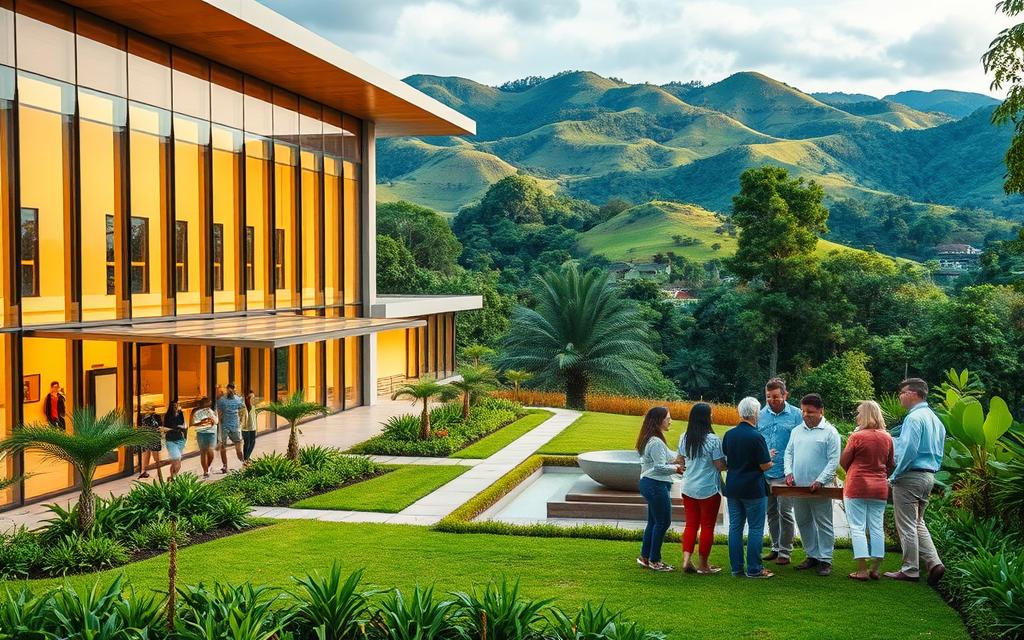Is Healthcare Free for Costa Rica Residents? | JAROS C.R.

Did you know Costa Rica ranks 36th globally for its healthcare system? This small Central American country has become a top destination for expats seeking a better quality of life. With its stunning natural beauty, mild climate, and rich culture, it’s no wonder people are flocking here.
For those considering residency, options like the Rentista, Investment, and Permanent programs make it accessible. But what about access to medical care? The country’s universal healthcare system, managed by the Caja Costarricense de Seguro Social (CCSS), ensures coverage for all residents.
Whether you’re an expat or a local, understanding the costs and benefits of health insurance is crucial. This guide will explore the details of Costa Rica’s healthcare system, helping you make informed decisions about your future in this vibrant country.
An Overview of Costa Rica’s Residency and Healthcare Landscape
Living in Costa Rica offers a unique mix of culture, nature, and excellent medical care. This Central American gem is not only known for its stunning landscapes but also for its high-quality lifestyle. For expats, residency opens doors to new opportunities, including access to one of the world’s top-ranked healthcare systems.
Quality of Life and New Opportunities
Residency in Costa Rica brings significant lifestyle improvements. The country’s warm climate, friendly locals, and affordable living make it an attractive destination. Expats can enjoy a slower pace of life while still having access to modern amenities.
One of the most appealing aspects is the healthcare system. With over 30 hospitals and 250 clinics, residents have access to comprehensive medical care. Whether you need routine check-ups or specialized treatments, the facilities are well-equipped to meet your needs.
The Role of Residency in Enhancing Access to Healthcare
Residency status is key to unlocking the benefits of Costa Rica’s healthcare system. The public healthcare system, managed by the Caja Costarricense de Seguro Social (CCSS), covers 91% of the population. Residents contribute a percentage of their income, ensuring access to essential services.
For those who prefer private care, the country offers a range of options. Private health insurance plans are affordable, with monthly premiums starting at $50. This dual system allows residents to choose the best care for their needs.
Many expats find that residency not only improves their quality of life but also provides peace of mind knowing they have reliable medical care. With its blend of public and private options, Costa Rica’s healthcare system is a major draw for those seeking a better future.
Understanding Costa Rican Residency Options

Costa Rica’s residency programs open doors to a vibrant lifestyle and access to its renowned healthcare system. Whether you’re an expat or planning a long-term stay, understanding the available options is essential. Each residency type offers unique benefits, ensuring you can integrate seamlessly into the country’s healthcare framework.
Rentista Residency Explained
The Rentista Residency is ideal for individuals with a stable income. To qualify, applicants must demonstrate a monthly income of at least $2,500 from investments, annuities, or rental properties. This option is perfect for those who want to enjoy Costa Rica’s lifestyle without needing employment.
Once approved, Rentista residents gain access to the public healthcare system managed by the Caja Costarricense de Seguro Social (CCSS). This ensures comprehensive coverage for medical needs, from routine check-ups to specialized treatments.
Investment and Permanent Residency Pathways
For those looking to invest, the Inversionista Residency requires a minimum investment of $150,000 in a Costa Rican business or property. This pathway not only secures residency but also opens doors to the country’s private healthcare options, offering flexibility and additional coverage.
Permanent Residency is another attractive option, available after three years of temporary residency. This status grants full access to both public and private healthcare systems, ensuring long-term peace of mind. It also allows residents to work without additional permits, making it a popular choice for expats.
Each residency option enhances your ability to integrate into Costa Rica’s healthcare system. Whether you choose Rentista, Investment, or Permanent Residency, you’ll enjoy a high quality of life and reliable medical care. For more details on residency in Costa Rica, explore our comprehensive guide.
Overview of the Costa Rican Healthcare System

Costa Rica’s healthcare system blends affordability and quality, making it a standout in Latin America. The country operates a dual model, offering both public and private care options. This ensures comprehensive coverage for residents and expats alike.
The public healthcare system, managed by the Caja Costarricense de Seguro Social (CCSS), provides universal coverage. Residents contribute a percentage of their income, granting access to essential services. This system is known for its affordability and inclusivity.
Public Versus Private Care
Public healthcare offers extensive coverage, including routine check-ups, surgeries, and emergency care. However, wait times for non-emergency procedures can be lengthy. For those seeking faster access, private facilities provide excellent elective services with shorter wait times.
Private healthcare is a popular choice for expats and those who prefer flexibility. Many private hospitals, like CIMA and Clínica Bíblica, are internationally accredited. These facilities offer advanced treatments and personalized care, often at a fraction of U.S. costs.
Global Rankings and Notable Achievements
Costa Rica’s healthcare system is globally recognized. The World Health Organization ranks it 36th worldwide, surpassing countries like the United States. The United Nations places it among the top 20 systems globally, highlighting its efficiency and quality.
Life expectancy in the country is nearly 80 years, a testament to the system’s effectiveness. With over 30 public hospitals and 250 clinics, residents have access to reliable medical care. For more details on residency and healthcare integration, explore our guide on Costa Rica residency.
Is Healthcare Free for Costa Rica Residents?
Costa Rica’s universal healthcare model ensures coverage for all, but how is it funded? The public healthcare system, managed by the Caja Costarricense de Seguro Social (CCSS), is not entirely free. Residents contribute a percentage of their income to access its services.
Monthly contributions range from 7% to 11% of an individual’s earnings. This income-based fee structure ensures that everyone, regardless of financial status, can receive medical care. For those with lower incomes, the government may fully cover their contributions.
Expats and citizens alike benefit from this system. While residents pay into the CCSS, visitors must rely on private insurance or pay out-of-pocket for services. This distinction highlights the importance of residency in accessing affordable care.
The CCSS provides comprehensive coverage, including routine check-ups, surgeries, and emergency care. Although not free at the point of service, the costs are significantly lower than in many other countries. This makes Costa Rica’s healthcare system both accessible and affordable.
By balancing contributions and coverage, the country ensures that its residents receive quality medical care. Whether you’re an expat or a local, understanding this funding model is key to making the most of the healthcare system.
Navigating the Public Healthcare System: The Caja Costarricense
The Caja Costarricense de Seguro Social (CCSS) is the backbone of Costa Rica’s public healthcare system. It ensures universal coverage for residents, offering a wide range of medical services. Whether you’re a local or an expat, understanding how the CCSS works is essential for accessing quality care.
Membership, Coverage, and Benefits
Membership in the CCSS is available to all residents, including expats with legal residency. Once enrolled, members gain access to comprehensive medical care. This includes routine check-ups, surgeries, emergency services, and even prescription medications.
The system emphasizes preventative care, helping residents maintain their health. With over 30 public hospitals and 250 clinics nationwide, the CCSS ensures that medical care is accessible to everyone. This universal approach has made Costa Rica’s healthcare system one of the most efficient in the world.
Enrollment Process and Income-Based Contributions
Enrolling in the CCSS requires submitting proof of residency and income. Applicants must attend an interview and provide necessary documentation. Once approved, monthly contributions are calculated based on income, typically ranging from 7% to 11%.
For those with lower incomes, the government may cover these fees entirely. This income-based structure ensures that everyone can access medical care, regardless of their financial situation. While the system is not free, it remains affordable compared to many other countries.
Despite its efficiency, the CCSS faces challenges like long wait times for non-emergency procedures. Many residents choose to supplement their coverage with private insurance for faster access to specialized care. This dual approach allows individuals to enjoy the best of both systems.
Exploring Private Healthcare Alternatives
Costa Rica’s private healthcare system offers flexibility and quality for those seeking alternatives. Many residents and expats choose private options for faster access to specialized care and advanced treatments. This section highlights top private hospitals, clinics, and insurance plans available in the country.
Top Private Hospitals and Clinics
Costa Rica is home to several renowned private medical facilities. CIMA Hospital, located in San José, is known for its state-of-the-art technology and international accreditation. Clínica Bíblica, another leading facility, offers a wide range of services, from general consultations to complex surgeries.
Clinica Católica is also a popular choice, providing specialized care in areas like orthopedics and cardiology. These hospitals attract both locals and medical tourists due to their high standards and shorter wait times compared to public facilities.
Private Health Insurance Options
Private health insurance plans are widely available in Costa Rica. Companies like Cigna Global offer comprehensive coverage for expats and residents. These plans provide access to private hospitals, clinics, and specialists, ensuring timely and personalized care.
Monthly premiums for private insurance start at around $50, making it an affordable option for many. Coverage often includes elective procedures, alternative therapies, and emergency services. For those who prefer a mix of public and private care, these plans offer added flexibility and peace of mind.
Healthcare Costs in Costa Rica: An In-Depth Comparison
The cost of medical care in Costa Rica is significantly lower than in many other countries. This affordability, combined with high-quality services, makes it an attractive destination for both residents and expats. Whether you’re seeking routine check-ups or specialized treatments, the expenses are often a fraction of what you’d pay in the U.S.
Cost Advantages Compared to the U.S.
Medical visits in Costa Rica are remarkably affordable. A consultation with a general practitioner typically costs around $50, while specialist visits range from $60 to $100. In contrast, similar services in the U.S. can cost several hundred dollars.
Diagnostic tests are another area where Costa Rica shines. An MRI scan, for example, costs approximately $500, compared to $1,200 or more in the U.S. Blood tests and X-rays are also significantly cheaper, making preventive care more accessible.
Surgeries in Costa Rica are equally cost-effective. Procedures like knee replacements or cataract surgery can cost as little as one-third of U.S. prices. This affordability has made the country a hub for medical tourism, attracting patients from around the world.
These cost advantages benefit both residents and expats. For locals, the public healthcare system ensures access to essential services at minimal costs. Expats, on the other hand, can enjoy high-quality private care without breaking the bank.
Lower healthcare expenses also contribute to Costa Rica’s appeal as a retirement destination. Many retirees find that their savings go further here, allowing them to enjoy a comfortable lifestyle while accessing top-notch medical care.
How Residency Status Impacts Healthcare Options
Residency status plays a critical role in determining access to medical services in Costa Rica. Whether you’re a temporary or permanent resident, your legal status directly influences your eligibility for public and private healthcare programs. Understanding these distinctions is essential for making informed decisions about your medical care.
Eligibility for Public Healthcare Programs
Legal residents, including expats, must join the Caja Costarricense de Seguro Social (CCSS) to access public healthcare. Enrollment requires proof of residency and income, with monthly contributions ranging from 7% to 11% of earnings. This income-based fee ensures that everyone, regardless of financial status, can receive medical care.
Temporary residents enjoy the same coverage as permanent ones, including routine check-ups, surgeries, and emergency services. However, permanent residents often benefit from additional flexibility, such as the ability to work without additional permits. For those with lower incomes, the government may fully cover their contributions, making the system accessible to all.
Non-residents, including tourists, are not eligible for CCSS coverage. They must rely on private insurance or pay out-of-pocket for medical services. This distinction highlights the importance of obtaining residency for long-term access to affordable care.
Public and Private Healthcare Interplay
Residency status also influences access to private healthcare options. Many expats choose private insurance for faster access to specialized treatments and shorter wait times. Private plans are affordable, with monthly premiums starting at $50, and provide coverage for elective procedures and alternative therapies.
Combining public and private healthcare allows residents to enjoy the best of both systems. For example, expats can use the CCSS for routine care and private facilities for specialized treatments. This dual approach ensures comprehensive coverage tailored to individual needs.
For more details on residency and its benefits, explore our guide on Costa Rica citizenship. Understanding how residency impacts healthcare options is key to making the most of the country’s renowned medical system.
Medical Tourism and Expat Healthcare Experiences
Costa Rica has become a top choice for medical tourists seeking affordable, high-quality care. The country’s blend of advanced facilities and natural beauty attracts thousands of visitors annually. Expats and retirees also benefit from its reliable and cost-effective medical services.
Benefits for Expats and Retirees
Expats and retirees find Costa Rica’s healthcare system highly appealing. Private hospitals offer advanced treatments at a fraction of U.S. costs. For example, a knee replacement here costs around $12,000, compared to $50,000 in the U.S.
Many retirees choose private health insurance for added flexibility. Monthly premiums start at $50, making it an affordable option. This ensures access to timely care without long wait times.
Popular Destinations within Costa Rica
San José is a hub for medical tourism, home to renowned facilities like CIMA Hospital and Clínica Bíblica. These hospitals are internationally accredited, offering services from general consultations to complex surgeries.
Other regions, such as Guanacaste and Puntarenas, also attract medical tourists. These areas combine quality care with stunning landscapes, making recovery a pleasant experience.
For more details on residency programs, explore our guide on the Pensionado Program. Understanding these options can help you make the most of Costa Rica’s healthcare system.
Blending Public and Private Healthcare: Best of Both Worlds
Combining public and private healthcare in Costa Rica offers residents the best of both worlds. This dual approach allows individuals to enjoy comprehensive coverage, flexibility, and improved access to medical services. By leveraging the strengths of both systems, expats and locals can optimize their care.
The public healthcare system, managed by the Caja Costarricense de Seguro Social (CCSS), provides universal coverage for routine check-ups, surgeries, and emergency care. However, wait times for non-emergency procedures can be lengthy. This is where private healthcare steps in, offering faster access to specialized treatments and advanced facilities.
Many expats choose to use the CCSS for routine care while turning to private clinics for specialized needs. This synergy between the two sectors ensures that residents receive timely and high-quality medical care. For example, private doctors often work in both systems, allowing prescriptions filled at public pharmacies to be covered under the CCSS.
Blending public and private healthcare also offers significant cost benefits. While the public system is affordable, private insurance plans start at around $50 per month, providing additional coverage for elective procedures and alternative therapies. This dual approach ensures that residents can access the care they need without financial strain.
For expats, managing appointments in both systems can be streamlined. Start by enrolling in the CCSS for basic coverage, then supplement with private insurance for specialized care. This strategy not only reduces wait times but also enhances the overall quality of medical services.
Understanding how to navigate both systems is key to making the most of Costa Rica’s healthcare offerings. For more insights on residency and its benefits, explore our guide on Costa Rica dual citizenship. By blending public and private healthcare, residents can enjoy a seamless and efficient medical experience.
Ensuring Quality Medical Care for Your Family in Costa Rica
Families in Costa Rica can access a wide range of medical services tailored to their needs. The country’s healthcare system prioritizes family health, offering specialized care for maternity, pediatric, and chronic conditions. Whether you’re an expat or a local, understanding these services is key to securing quality care for your loved ones.
Maternity Services and Preferential Care
Pregnant women receive preferential treatment in the public healthcare system. Services include prenatal check-ups, ultrasounds, and postnatal care. The government ensures that expectant mothers have access to essential medical support throughout their pregnancy.
Private clinics also offer maternity packages with personalized care. Facilities like CIMA Hospital and Clínica Bíblica are popular choices for expats seeking advanced maternity services. These options provide flexibility and shorter wait times.
Pediatric Care and Specialized Treatments
Children’s health is a top priority in Costa Rica. Pediatric services cover routine vaccinations, developmental screenings, and emergency care. Public hospitals and clinics are well-equipped to handle common childhood illnesses.
For chronic conditions, specialized treatments are available in both public and private facilities. Families can access care for asthma, diabetes, and other long-term health issues. The quality of these services ensures that children receive the best possible care.
Planning Ahead for Healthcare Enrollment
Families should plan ahead to navigate the healthcare system effectively. Enrolling in the public system requires proof of residency and income. Once registered, all family members gain access to comprehensive medical care.
Private health insurance is another option for expats. Plans start at around $50 per month and cover specialized treatments and elective procedures. This dual approach allows families to enjoy the best of both systems.
Examples of Family-Friendly Facilities
Several hospitals and clinics are known for their family-focused care. CIMA Hospital in San José offers pediatric and maternity services with international accreditation. Clínica Bíblica is another top choice, providing advanced treatments for children and adults.
Public facilities like Hospital Nacional de Niños specialize in pediatric care. These hospitals ensure that families have access to reliable and affordable medical services.
Real-Life Success Stories
Many families have benefited from Costa Rica’s healthcare system. Expats often share positive experiences about the quality of care and affordability. These stories highlight the system’s ability to meet diverse medical needs.
By combining public and private options, families can ensure comprehensive coverage. This approach provides peace of mind and access to high-quality medical care for all family members.
Steps to Prepare for Healthcare Enrollment as an Expat
Registering for healthcare in Costa Rica as an expat requires careful preparation and understanding of the process. The country’s public healthcare system, managed by the Caja Costarricense de Seguro Social (CCSS), offers comprehensive coverage for residents. However, enrollment involves specific steps and documentation that expats must complete.
Documentation and Registration Essentials
To join the CCSS, expats must provide several key documents. These include proof of residency, a valid passport, and income verification. Processing times for residency applications average 18 months, after which applicants can register at a local clinic.
The enrollment process begins with an interview at the nearest CCSS office. During this meeting, applicants submit their documents and provide details about their income. Monthly contributions are calculated based on earnings, typically ranging from 7% to 11%.
For those with lower incomes, the government may cover these fees entirely. This ensures that everyone, regardless of financial status, can access medical care. Once enrolled, expats gain access to services like routine check-ups, surgeries, and emergency care.
To avoid delays, ensure all documentation is complete and accurate. Double-check forms and verify income details before submission. This step is crucial for a smooth enrollment process.
After registration, expats receive a CCSS card, which grants access to public healthcare facilities. This card is essential for scheduling appointments and receiving medical services. By following these steps, expats can seamlessly integrate into Costa Rica’s healthcare system.
Conclusion
Navigating medical care in Costa Rica offers both locals and expats a unique blend of affordability and quality. The country’s dual healthcare system ensures comprehensive coverage, with public and private options catering to diverse needs. Residents contribute a percentage of their income to access public services, while private plans provide flexibility for specialized treatments.
Residency status plays a key role in unlocking these benefits. Programs like Rentista, Investment, and Permanent Residency grant access to the public system and private facilities. This balance ensures that everyone, regardless of income, can receive high-quality care.
Costa Rica’s cost advantages are unmatched. Medical expenses are significantly lower than in many countries, making it an attractive destination for expats and retirees. Whether you choose public or private care, the system prioritizes efficiency and accessibility.
For more details on residency and healthcare options, contact JARO S.C.R. to explore how you can benefit from this exceptional system.


